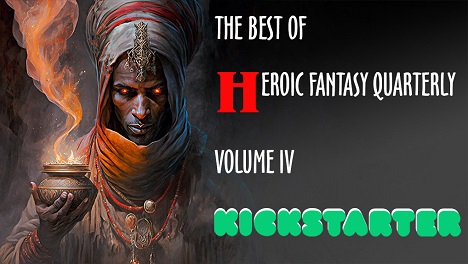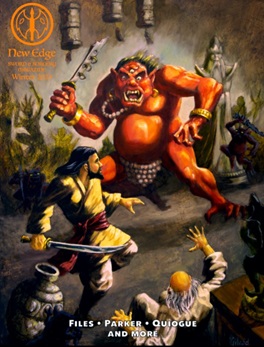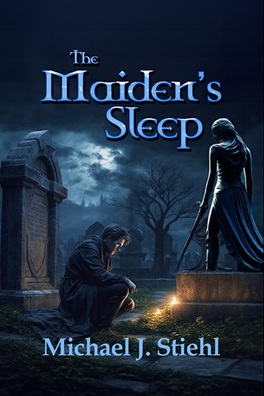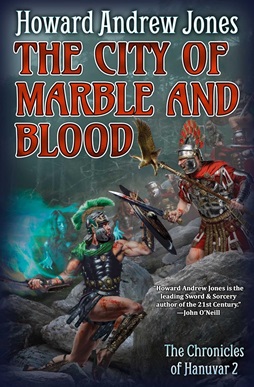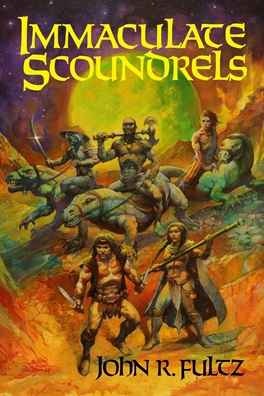ENGINES RARELY SEEN
ENGINES RARELY SEEN, by N.G. Lancaster
The Grift came back from upstairs all red-faced, saying that he was going to help his whore dole out a vendetta.
The whore himself, a wispy kid who was ugly but for his mop of chestnut hair, stood back on the stairs while the Grift made his declaration. The boy’s gaze darted around between the rest of us, waiting to see what we’d do.
I wrapped both my hands around my drink. The mug was sized for normal folk, so my fingers overlapped past the knuckles. I stared at that, my little wall of fingers, and I hoped that maybe the two of them would simply go back upstairs.
At the table next to me, Clasdale grumbled. When she leaned back, the wooden saints hanging around her neck clunked together. “You’re going to go dole out some townie justice all by yourself.”
“Well…” the Grift started to say. Gone was the bravado. “I thought… I mean, I thought someone else might come.”
“Did you?” Clasdale said. I just kept staring down. Or rather, I tried. I snuck a look up at the whore, and the whore saw me seeing him. He nudged the Grift, and then they were walking over past Clasdale to me while I cursed myself in my head. Then I saw the Grift’s big eyes reflecting at me off the top of my liquor.
“It’s a good thing,” the Grift said. “What we’re going to do.” His voice had gone soft, appealing. He knew his audience. “String’s family, they’re foresters. Two nights back, some men from the outfit that runs the docks ambushed their workers. Came on the lumber folk with shivs and put holes in all of them. Now they’re all rolling around and dying in String’s folks’ house north of town.”
I looked up from my drink again. Behind the Grift, the whore had wrapped his arms around himself. Behind the whore, I saw Clasdale frowning at me.
“String,” I said. “That’s the whore’s name?”
“Yeah,” the whore said, speaking for himself. His voice was squeaky. Dry. It was a voice that belonged in this old cathedral, whose clergy was gone or dead in the wake of the current troubles. The way I’d heard it, a taverner whose building was burned by the previous group of sellswords before us had taken his remaining stock and moved in here. He stacked the kegs back where the preachers used to vest and put mattresses up in the choir loft for the whores. The memory of incense in the air mixed badly with the bouquet of yeast and vomit, but the cathedral was stone. It wouldn’t burn as easy as a tavern. The whores, too, seemed to be made of sterner stuff in this high-ceilinged place.
“Well?” String squeaked at me. “You going to help?”
Clasdale shook her head at me. No.
I considered my drink. I wanted to enjoy it, but now I doubted that I could. The thought of simple lumber workers rolling around and dying from gut wounds stole my thirst. The thought of shit leaking into blood.
My mother had worked lumber all her life. As I felt my own big, axe-callused hands wring my cup, I tried to remember if I’d told the Grift about that part of my past.
I couldn’t be sure that I had.
“Won’t these docker-folk just hire more thugs to take their revenge once we’re gone tomorrow?” I said that to String while I watched Clasdale lower her head and press a hand to her brow.
“Naw,” String said. “Now that our lumberers are dead, the ones they sent out last night are the last able bodies in town. Everyone else was called.”
The good and godly Empress calls the able to her service. So said the criers. And so said the Grift now, in a singsong sort of voice. Mocking but excited. He stepped up next to me and waved the hilt of his expensive sword, prick-like. “And the levees took all the town’s weapons with them,” he said. “Shivs. That’s all they’ve got.”
From behind him, Clasdale: “What was that you said before, Grift? About you going off to do a good thing?”
The Grift acted like he hadn’t heard her. “Come on,” he said to me, leaning in over my drink. Over my hands. “They were just…” he paused. “Laborers,” he said finally. “Just workers. They didn’t deserve to get done like that.”
I decided that I agreed. So I stood up and went and got my stick.
When I stood, Clasdale looked up at me, sighed, and then followed me out.
Behind us, a pair of the other boys from the outfit began singing. They’d found an old hymnal beneath one of their drinking benches, and now their mismatched slurs grumbled up into the rafters.
*
On the riverfront beyond the cathedral’s doors, a barge was burning. The inferno’s fire was yellow, and it lit the exposed streets in the amber color of piss. The smoke that hazed around us gave off a pleasant, heavy smell of cherries.
When he stepped out, the Grift took a deep lungful through his narrow nose. And as the whore walked up beside him, I saw that the boy had a hitch in his step. It was pronounced enough, I realized, to exempt him from the Empress’s war call. And from a life as a lumberer, at that. But he had other skills. When the Grift turned to the boy, String’s whole posture changed. Became more needy. Maybe a little awestruck, too.
“You ever smoke the deeps, String?”
The boy shook his head.
“You should. Once, at least.”
“Not much likelihood of that,” Clasdale said from my other side. “Or did you forget our ‘good and godly’ Empress’s feelings on mind-benders aside from her precious pearl dust?” When Clasdale spoke of the monarch, she used the same inflection that the Grift had used back inside.
“I haven’t,” the Grift said. He took a couple of steps around me and pointed at the hanging wooden saint figurines around Clasdale’s chest. “You might have forgot what she said about idolatry, though.”
“Fuck yourself,” Clasdale said. She pulled her jacket over her saints and walked down the stone steps into the haze. She looked down the street, first to the left, then to the right. It was the town’s thoroughfare, and it curved along with the river. “Would someone ask the whore which way we’re going?”
String pointed left. South.
“Let’s go then,” Clas said as she shot me a look. She was reminding me that she was only going because I was. No matter that I hadn’t asked her to come.
Even though I stood half-again taller than she, Clas often told me that I reminded her of her second son. And Clas was willing to go through much for her children.
I stepped out to join Clasdale in the lead while the Grift lagged, keeping pace with String and his limp. Beneath our feet, we stepped over the ruins of all the old sins that the Empress was carving away from her new lands like a bold revisionist sculptor. These river folk had kept little dolls of their dead, not unlike Cladale’s saints. Now I noticed Clas stepping over one such doll where it lay in the street. She cared less about the story pots, though. They were these fired vessels with winding pictographic narratives of river families on them, and they lay broken on the ground along with the dolls. They crunched beneath Clasdale’s boots as she turned on her heels. We’d gone maybe a half-dozen blocks.
“Where are you taking us?”
“He already said,” the Grift told her. “He-“ but then he stopped as a fit of coughing from the deeps smoke overtook him. The river breeze had picked up, letting off thick walls of the stuff from the burning barge. I wondered, absently, how many fortunes were going up on that floating pyre.
Next to me, Clasdale spoke. “I was talking to you,” she said. She was looking at String. I noticed that she’d slipped one of her saints into her hand.
“The dock folk keep to a boathouse,” String said while the Grift kept coughing. “Down past there.” He pointed over Clasdale’s shoulder, to a building that must have stood tall before its largest wall had collapsed. Now, what remained of the place hunkered low, sagging as it waited to collapse the rest of the way.
Clasdale ran her thumb over the saint in her hand. “It’d be pretty easy, she said in a musing voice, “for this run to be a little trap, wouldn’t it? You could lead us into some bottleneck and some friends could kill us with, hell, I don’t know, rubble dropped from rooftops? War time is lean, after all. I bet your lumber folk would like some stolen coin even more than they’d like vengeance for their dead.”
The way String looked back at her, I knew he hadn’t done that. His face twisted up, like he was staring at someone who’d just stolen his mark for the night. Jealousy. Because he hadn’t thought of doing that to us.
I turned to Clasdale and told her that. I said it to her in my real voice, my giant’s voice, my words thick enough that westerners like the Grift and String wouldn’t understand my brogue. String, not comprehending, turned and hobbled past us, up to the shattered plaster chunks that had once been part of the fallen wall. He pointed to the walls that remained, drawing our attention to the white-wash that crisscrossed the structure in sloppy designs. Tags.
He pointed. “That’s dockers. That’s well-keepers, over there. Lumberers don’t have anything south of the cathedral.” I don’t have any friends down here to kill you with.
The Grift finally choked down his next cough. “See? He’s taking us where he said he was.”
Clasdale looked at me, then back at the Grift. “Some paint isn’t proof of anything,” she said. I kept quiet. She had to make the decision here. Clasdale’s family, her real kids, wouldn’t get anything from the Empire if she died here on some townie vendetta instead of on one of the Empress’s battlefields. If she wanted to back out, I’d not stop her.
Clas looked from the sagging walls covered in white slop to the plaster debris at our feet. A piece next to her toe had part of a face painted on it, a bit of some obliterated fresco. There was the bottom of a nose, some of an upper lip. Probably a woman’s. The left side of the plaster chunk was broken away clean in a curving gash. There, I guessed, was where they’d driven a hook in to pull down the wall.
I wondered what the whole thing had looked like. I wondered how the image might have offended the Empress, or at least her enforcers. I was about to ask String about the fresco when Clasdale spoke.
She addressed me in the giants’ patois. “How likely, do you think, that we’ll meet the fourth legion when we march tomorrow?”
“Fair,” I said. I didn’t know, but that’s what the others had been saying at the cathedral.
Clasdale let the saint she’d been holding drop. It swung on its leather thong, clattering back against the others on her chest. She turned her free hand palm-up and stared at it. Stretched out her long, pale fingers. Clasdale was one of the few kinds of soldiers that could do her work and come back with soft hands. “They’ll probably have a squadron of hematists with them, won’t they?”
Blood mages. The Empress’s only approved medium of spell craft. Clas had said more than once that she despised the red casters, though she knew she’d have to join them when we met the legion. Only hematists’ families were afforded death benefits. “Yeah,” I said.
Clas found another saint from the many hanging from her neck. Ran thumb and forefinger over the worn thing. “I suppose that makes tonight special, doesn’t it?”
Behind us, the Grift was talking to String like we weren’t there. Maybe he thought we weren’t paying attention. “She needs soldiers with experience,” he was saying. “When we join the legion, I’ll be sworn in as a squad commander. At least.” He said it like he really believed it.
String looked up at him. Again, the boy looked younger, more naive, than when he’d eyed me in the cathedral. “Is that important?”
“I’ll have a tent you could stay in.”
“Cripples can’t be imperial whores.”
“I’d say you were my footman.”
String’s act broke for an instant. He made a noise that showed how likely he thought that to be. He’d composed himself a second later, but by then the Grift had already turned away, embarrassed.
“Enough,” Clasdale said. “Let’s go. But you all stay out of my way when we get there.”
String hobbled on, leading now. We followed. He brought us to this boathouse with a little slat wood wall around its section of the pier. At the gate, an old man sat with a pitchfork. Seventy at least, I decided. I turned to Clas, but she’d already picked up one of her saints, the little curving statue of the Artisan. When I saw that, I knew she didn’t care how old he was.
I stepped ahead of her. She hissed at me. “Get back, I-“
“We’re coming through,” I told the old man as he stood up. The light from the burning drug barge still washed the pier, and it made him look jaundiced. I pointed down the road with my stick. “Just go.”
He stood up. Then he charged me, pitchfork leading. He almost yelled an alarm, too, but Clasdale was quicker. She did whatever she did to invoke her Saint Artisan, and the old man came apart like a painting in reverse. The stuff of him sloughed away, color by color, unraveling. When the yellow gleam from the fire came away, his face went with it. The gleam spattered against the slat board wall in a burst of gold. The other colors went after, brightest to darkest. The browns and blacks of him went last. Those leaked through gaps in the pier like tar, along with the little bits of dark orange color that had once been the rust along the pitchfork. Then the old man was gone.
“I told you to stay back,” Clasdale said to me as she walked through the gate, stepping through the puddles without a thought for the man they’d been. Her head passed a little spot of blue on the wall that I guessed was from the old man’s eye.
Behind me, the Grift unsheathed his sword.
*
The dozen or so thugs that had attacked the lumber workers were sleeping, scattered over the small barge and the two rowboats that roosted inside the boathouse. There were no lamps in here, but the house’s open mouth to the water let in the firelight from the floating pyre upriver. They didn’t hear us come in, didn’t hear Clasdale step up to the first rowboat and lift her statue of Saint Stillborn. She set the figure between the man and the woman inside the boat, and the two of them let out undulating screams through a range of pitches as their heads distended and their limbs crumpled to match the proportions of the little figurine.
By the time the two of them went silent, the others were up. They climbed onto the dock and came at us in a confused rush, little metal shards brandished in their hands. I put my stick to one. The iron brads along the shaft caught and held the docker’s face even after the rest of him rolled away and fell into the water.
To my left, the Grift made little affirmative noises while he swung his sword at the one that’d engaged him. He sounded like he was at cutting practice in a yard, and in a way I supposed he was. Against his three feet of sharpened steel, the docker’s shiv was a matchstick.
The Grift bellowed with the kill like he’d earned it. He shut up quickly, though, when the next woman over came at him not with a stick but a handmade maul, a length of raw lumber speared with jagged iron scraps. One swing of it and the top third of the Grift’s expensive sword snapped off.
The Grift stumbled back, hollering, and I was moving over to help when another docker found me with his own improvised weapon. A shard of leaded glass tied to the end of an oar speared my calf, and the glass broke off within my muscle.
This is what comes of the Empresses’s levees taking all the swords, I thought as I tumbled to the dock’s slats, my leg screaming. The weapons didn’t disappear. They just got uglier and more brittle.
The docker was was coming up on me, oar held high, as I rolled over onto my back. He swung for my head but I caught the oar, and when I yanked it to me the man came with it. Once I had him in my hands it didn’t matter that I wasn’t standing up. I broke him, and after I’d dropped him into the water I got up, found my stick, and looked for the others.
I didn’t see the Grift, but I didn’t look for long. Once I saw Clasdale I couldn’t look away.
Further down the dockhouse, Clas had pulled her tiny statues away from her neck and held the strings in her hands while she invoked her saints one after the other.
I saw that she’d used Saint Crier to claim ears, the intricate chucks of which now lay outside of three docker heads.
In her other hand was the statue of Saint Physician, he who dissected, and I watched along with two other dockers as their hands fell off, bouncing onto the slat boards in front of them.
In battle, I’d always found Clas’s saint sorcery to be grotesque, but I could never stop watching. When Clas was at work, I saw things function and act in ways that I’d never seen elsewhere. I always thought of it like some little-known engine of the world, some mechanism that was obscured all the rest of the time. I couldn’t help but treasure such glimpses, appalling as they were.
I was still watching Clas’s latest pair of attackers come apart into neat, orderly sections when the last docker struck out from the corner where he’d been hiding. I wasn’t paying attention, so I didn’t see him until it was too late. His outstretched hand boasted a little brass slicer on the end of his index, shaped like some torturer’s thimble. The blood welling out through the little device fueled the docker’s spell, and like called to like.
Next I knew, Clas and I were both on our knees. Red welled up from under my fingernails, and I felt a fresh gush out of my leg wound. I tasted blood and I knew I’d piss it later.
Clasdale tried to lift her little statue of Saint Thief, but it slipped from her now-slick fingers. I saw the little statue clatter between the boards of the dock just as a terrible pain began to well in my eyes, pressing out. I shut my lids quickly as I could, but next to me, I heard Clasdale cry. Something wet spattered against the floor.
I took my stick and threw it where I remembered the blood mage to be standing. I heard wood splinter and crack, and I knew I’d missed. The pain got worse. My muscles gave.
Just as my elbows hit the dock, the Grift let out another one of his cutting practice bellows and a new voice’s screams filled the boathouse. Moments later, when I was brave enough to open my eyes, I saw the blood mage laying in a pool of his own wasted medium. His arm, the one with the thimble-cutter, had landed not far from me.
I swore.
“What’d you say?” the Grift asked, the remaining length of his sword bloody. “You all right?”
I grunted and stood up, looking for Clas. She was leaning over the dock, laving river water up onto her face with her hand.
“My god,” the Grift said when she turned around. “Let’s get something over that.”
The Grift rooted around the boathouse for a bandage while I limped over and helped Clas to stand up. Immediately, she walked over to the blood mage’s severed hand. She brought her boot heel down on it, crunching the bones. Then she plucked up the little finger-slicer. She worked the hinge with her pale, dirty fingers, and the thing swung open. Inside, you could see the curving, inward-facing razor. The little runnel for the blood underneath.
The Grift came up and offered Clasdale something to wrap around her head and cover her socket. She waved him away, though, and the Grift retreated back to String.
The whore was still standing in the doorway, mouth agape at the scene in front of him. The infant-proportioned corpses. The orderly dissections next to Clas. Next to String’s own feet lay the docker who’d had the club, writhing now with the stomach wound the Grift must have given her. Her shit now leaking into her blood.
“Was that all of them?” the Grift asked.
“Sure,” String said, his voice distant.
The Grift turned back to me. “We did a good thing,” he said. He tried to look over at Clasdale, at her eye, but he kept turning away. “We did.”
“Let’s go,” Clas said.
After I pulled most of the glass out of my leg, I went over and got my stick out of the hole it had punched in the wall. Then we went.
*
Outside, I watched String pull his professional self back together. When the Grift tried to put his arm around him, the boy resisted for a moment, but then he remembered himself and pressed, warmly, into the embrace. That slowed the both of them to a pace that the limping whore could manage, but after what had happened to Clas and I, neither of us were driven to speed. Once, the two of them stopped and stared out at the curling dragon’s tail of smoke that still hung over the river. The drug barge’s fire had shrank to a smolder, and the streets were clearing.
The deeps’s smell of cherries had receded some. One more note in a brown bouquet, now.
“Those lumberers can rest easy,” the Grift said. His face and hands were clean. His white teeth reflected the last of the gleam from the barge fire.
Next to him, String played his part. “They can,” he said.
Next to me, Clas pulled something out of her bloody socket and flicked it away.
When we got back, String led the Grift upstairs to the choir loft by hand. The sight made me think of a returning hero. Or of a soldier going off to die. As I watched them go, I knew my thirst wouldn’t be returning tonight, so instead I watched Clasdale. She was going back to sit where she’d been, an hour and an eye before.
She sat down silently. I noticed now that she hadn’t put her wooden saints back around her neck. Nor did I see them anywhere else on her person. In her hand, however, was the finger-slicer she’d taken from the dead blood mage.
I was standing to her right, her blind side, so I didn’t know if she knew I was there.
She worked the little thimble-device for a few moments, turning it around in her hands before she fit it to her pale finger with a small click.
*
It was two days of marching before we met with the Empress’s fourth legion, where curving ranks of soldiers formed half-moons around the burly titans that bore her war engines on their backs. There, I was immediately met by two more of my kin, and they led me off to the separate camp where the Empress’s giants were sequestered. As I’d heard rumored, we were granted no drink but water in wartime.
The next day, when the fourth legion marched, I caught sight of Clasdale. She was on horse, and now both her index fingers were sheathed in brass slicers, just like the blood mages before, behind, and next to her. Amongst them, even with her eye-patch, Clas looked like she belonged.
___________________________________________
N.G. Lancaster is a Nebraska author whose work has previously appeared in Midwestern Gothic magazine (under the name Nick G. Lancaster). He keeps black shirts and birds.
